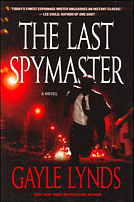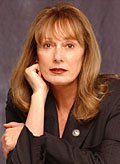The Decade of the Spy
by Gayle Lynds
More than two millennia ago, an Ionian ruler named Aristagoras received into his court a slave who relayed a message - shave my head. Aristagoras ordered it done, read the information tattooed on the slave's scalp, and started a major war.

|
At U.N. headquarters, so many undercover ops staff the organization and hold regular positions with the nearly 200 ambassadors that everyone from delegates to lowly file clerks is on heightened alert. Still, the monolithic building leaks secrets like a sieve. In fact, diplomats desperate to send ultra-sensitive information home have resorted to old-fashioned, low-tech means -- they hop on planes and deliver it personally.
Welcome to the Decade of the Spy. This is an intelligence era of dark tragedies and courageous triumphs, of expensive arrogance and merciful humility. And of stories. Colorful, poignant, telling stories about real people -- heroes, knaves, and those who haven't a clue. How could I resist? How could any author? This seething cauldron inspired me to write The Last Spymaster. In it I hoped to create an espionage giant whose flaws reflected the questions we read in today's headlines, while his strengths epitomized the best of our humanity.
Hollywood, too, has answered the call. Movie theaters showcase fictional spies in everything from the massively thoughtful Syriana to the comic Mr. and Mrs. Smith, from the tragic Constant Gardener to the subversive Match Point. Television has an explosion of offerings, too. While most new series are shooting stars never to be seen again, a few spy stories — like Alias and 24 -- have become near icons, and remarkably quickly.
How very different were the 1990s, those cozy years after the Iron Curtain disintegrated. The very existence of the CIA was in question -- the U.S. Congress seriously discussed disbanding it. At the same time, the old Soviet Union reeled, no longer believable as an arch enemy in fiction or fact. The sales of espionage novels plummeted, and producers quit making movies about spies. The final blow came in 1998 when both John le Carré and Frederick Forsyth declared the field dead and went off to write other books.
During this decade, editors were warned to buy no books by new espionage authors. Unsurprisingly, only a rare few managed to break into print. I was one, too ignorant to know I wasn’t supposed to, too determined to be stopped even if I had known. I found the post–Cold War world exciting, dangerous, and -- if anything -- even more important. In this shadowy lull, we Americans liked to think we were at peace and, as the last standing superpower, untouchable.
But all governments lie. All spies lie. And they are supposed to. But that doesn't make it right. On the other hand, sometimes it does. All novelists lie, too. But we call it fiction. This was a natural alignment that beckoned. And also ... there is that top-secret security clearance of mine, which I never quite forget.
The Decade of the Spy is not an easy time. Moral ambiguity grows on sniper sites and in the halls of Congress. Because we live in a democracy, we're able to recognize that and talk about it. Even more important, we must not avert our eyes but carry what we learn forward with us, in hopes of creating a better world.
 Gayle Lynds is the New York Times bestselling author of four thrillers, including
The Coil, as well as co-author of three novels with Robert Ludlum. She lives in
Santa Barbara, California. Gayle Lynds' latest novel is The
Last Spymaster (St. Martin's Press), an exciting
modern espionage thriller. You can visit her website at GayleLynds.com.
Gayle Lynds is the New York Times bestselling author of four thrillers, including
The Coil, as well as co-author of three novels with Robert Ludlum. She lives in
Santa Barbara, California. Gayle Lynds' latest novel is The
Last Spymaster (St. Martin's Press), an exciting
modern espionage thriller. You can visit her website at GayleLynds.com.
Return to the June 2006 issue of The IWJ.
More from Writers Write
